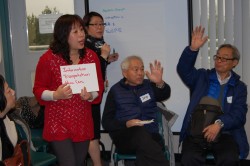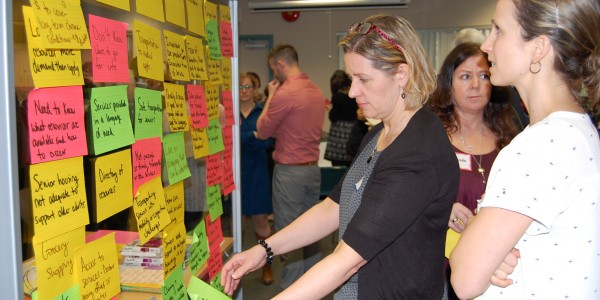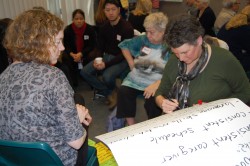Creating better seniors’ care in Richmond
Eager to comment and share their personal stories and experiences, more than 75 patients, caregivers, VCH staff, community partners and physicians gathered on Tuesday, January 26 to add their thoughts to development of a new seniors-oriented primary care model taking shape in Richmond.
This first in a series of three Community Engagement sessions included interpretation into Cantonese and Mandarin to ensure the full participation of Richmond’s multicultural community.
“Our goal is to develop better ways to keep older adults well at home and in the Richmond community,” said Natalie McCarthy, director, Residential Care and Mental Health & Addiction Services, in her opening remarks. “If you’ve had the experience of receiving care, or have helped a loved one navigate the health care system, your observations and insights are key in helping us create more accessible and responsive services. We want to hear about your health needs and ideas about how they can best be met.”
Across VCH, all three Communities of Care are developing care models to target seniors, 70+ in age, who have moderate to high complex chronic conditions and increasing risks or signs of frailty.
A new model of care
A small group is currently working on developing the Richmond-specific primary care model, and input gleaned from the Community Engagement sessions will further inform it. In this new model, it’s envisioned that care will be provided by a team, and will wrap around the client’s and family’s needs. Members of the care team will include the GP, nurse and social worker.
“Today many people don’t know what care is available or how to access it. This means their only choice for non-emergency care becomes the ED. We want people to know that their care team — and their primary care home — is the place where they can get their healthcare needs met,” said Nellie Hariri, director, Primary, Home and Community Care. “This is why we need to make fundamental changes to the way in which we provide their care.”
Augmenting care with technology
Michael Tsao, 33, is caregiver to his 88-year old father. He was alerted to Tuesday’s Community Engagement session by his father’s physician. A generation or two younger than most session attendees, Tsao believes families must increase their own capacity for caregiving and look to technology to help them care for their aging parents.

Input into how to provide improved care to seniors was provided by people from across Richmond’s multicultural community.
Tsao, himself, taught his father to use an iPad to communicate when his hearing failed. He is now exploring new technologies that will track his father’s real-time movements throughout the house to ensure he hasn’t fallen and hurt himself.
“There’s only so much that the healthcare system can handle,” said Tsao who, along with his friend, fellow caregiver and session attendee, Aruna Somasir, chat daily about ways to keep their parents at home and away from the healthcare system for as long as possible. “We’re trying to think long-term.”
As important as our children
Richmond resident Jane Mighton attended Tuesday’s Community Engagement session, representing the patient voice.
Mighton wants to see dementia care standards increased for older adults in the acute setting. She also wants more in-home care made available to dementia patients to prevent the confusion and disorientation that accompanies trips to healthcare providers’ offices.
“We need to value dementia patients as much as we value children in our society,” she said. “We need to create a dementia-friendly community.”
Next steps
Additional Community Engagement sessions will run in Richmond on February 4 (in Mandarin and Cantonese) and on February 9 (English, Cantonese and Mandarin).
Seniors and family members who are not able to attend the sessions can offer their input via one-on-one interviews with VCH Community Engagement. So far, 18 individual interviews have been completed, and 15 more are scheduled.
A new Seniors Prototype Care Model that reflects community input will be presented to the VCH Senior Executive Team for approval in March.
“VCH is not in this alone in development of a new care model,” said Hariri. “All B.C. health authorities are working together with the Ministry of Health to develop a better approach to seniors care in the community — to think outside the existing service box — as we work to transform the health care system.”
Want to learn more?
- Link to Vancouver story – What do seniors need?
- Link to Coastal story – Community forums tap seniors’ knowledge for new care model



lillian hung
It’s so nice to see such a participatory approach in engaging citizens to co-design the future healthcare